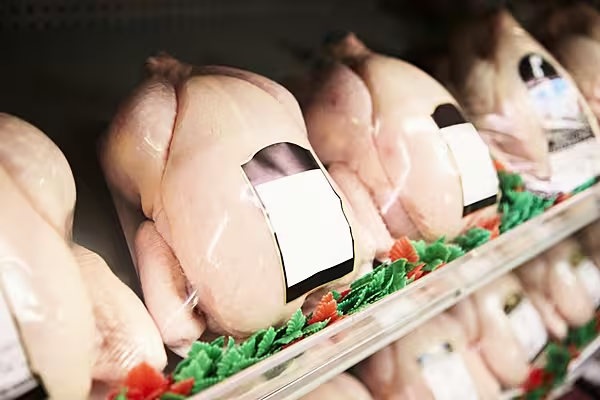French poultry farmer Isabelle Leballeur is fed up with European trade agreements that allow low-cost chicken into France and is determined to stop post-Brexit Britain getting that kind of deal.
Along with other farmers, she is pressing France's president to scuttle any accord that lets Britain ease food safety rules - part of the reason the European Union is insisting on a level playing field in trade relations with its former member.
"You can't have a different way of doing things when it comes to regulatory standards," Leballeur said at her family-run farm in western France, where she has reduced the density of broilers in her rearing sheds to meet EU welfare commitments.
Food And Environmental Standards
The British government has said it will not relax food and environmental standards. But if it wants its own post-EU trade deal with the United States, it may come under pressure to do exactly that.
Washington wants Britain to change its food hygiene rules to allow chicken carcasses to be disinfected with chemicals such as chlorine. The EU requires washing with water, which the bloc's farmers say means they have to maintain stricter standards, which costs more.
"Everyone knows that American chicken is dunked in chlorine," she said. "It's a practice you'll never see in France."
Leballeur, who raises 250,000 chickens each year on her farm in the hills outside Le Mans, frets Britain will escape European regulations.
The farmers' main worry is that cheaper US imports could displace Britain's existing poultry imports, pushing them to France, which already imports cheap poultry from Brazil and Thailand, and driving prices further down.
But they are also concerned that chicken washed in disinfectant will enter the EU market via a British back door.
Asked how President Emmanuel Macron should respond to any British attempt to break free from EU regulatory alignment, Leballeur responded: "No deal. There's no doubt".
Three Assurances
The industry is demanding three assurances from Macron: Britain-EU regulatory alignment, no tariffs that might curb British imports of EU chicken, and country-of-origin labelling on all chicken sold in France, including in canteens and restaurants.
"We know the Irish border is going to be somewhat porous, so alignment is critical," said Anne Richard, head of the poultry industry body Anvol, which estimates that the poultry sector directly employs 100,000 people and generates €6.8 billion.
That is a fraction of France's €2.5 trillion economy and 67 million people, but farmers in France have outsized political influence.
European Agriculture Commissioner Janusz Wojciechowski said late last month third-party countries who export to the EU's single market should face the same demands on standards.
"It is a red line," he told Reuters on the sidelines of an agricultural show.
News by Reuters, edited by ESM. Click subscribe to sign up to ESM: European Supermarket Magazine.














